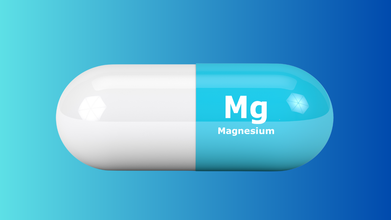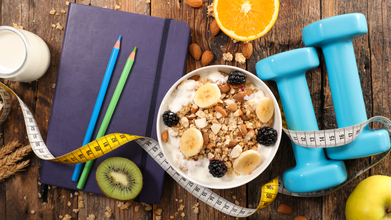- Health Conditions A-Z
- Health & Wellness
- Nutrition
- Fitness
- Health News
- Ayurveda
- Videos
- Medicine A-Z
- Parenting
- Web Stories
Harvard Doctor Shares 3 Tips To Lose Belly Fat With Intermittent Fasting

Credits: Canva
Those who have belly fat know it is a war when it comes to shedding that fat. It has been fought with everything, from crash diets to endless crunches, but the stubborn midsection just does not go away. Intermittent fasting is not a diet but a way of timing your meals that could help trim that fat. And according to Harvard-trained gastroenterologist Dr. Saurabh Sethi, there are three best tips to lose belly fat with intermittent fasting. One of these is particularly crucial.
Here is how intermittent fasting, done the right way, might finally come to your rescue.
Also Read: No Longer Need 10,000 Steps? 2,500-4,000 Are Enough To Protect Your Heart, Says Doctor
The 12-12 Kickstart
The idea of fasting can sound intimidating. Skipping breakfast or dinner or going without snacks sounds like punishment. But Dr. Sethi suggests starting simple: “First, start with a 12-12 fasting schedule, which is the mildest option. This approach helps you sleep soundly at night and reduces the likelihood of unhealthy food choices the next day."
What does that mean?
You fast for 12 hours (say, 8 pm to 8 am) and eat during the other 12. It is not extreme; you are basically just cutting out late-night snacking and mindless munching. That alone can save you hundreds of calories without you even noticing. Plus, your body finally gets a break from digesting round-the-clock, which helps regulate insulin and metabolism.
Sip Smart During the Fast
If you think fasting means surviving on air, you are wrong. Dr. Sethi is clear: “Second, during your fasting window, only drink black coffee, green tea, black tea, water, apple cider vinegar, lemon water, fennel or basil water, chamomile or ginger tea."
In other words, hydration is key. These drinks not only keep you from feeling bloated but also help curb hunger pangs. Black coffee can give your metabolism a gentle push, while herbal teas like chamomile or ginger soothe your system and reduce bloating. Flavoured waters (lemon, fennel, basil) keep things interesting and refreshing. The trick is: no sugar, no milk, no additions. Pure, clean liquids only.
Why does this matter?
Because breaking your fast with a sugary coffee or fruit juice is like trying to lose weight while eating cake for breakfast. Staying disciplined with what you sip makes intermittent fasting effective.
Build a Plate That Works Harder Than You
Fasting is not a free pass to eat pizza and pastries during your eating window. Dr. Sethi emphasises: “Third, focus on a high-fibre, high-protein diet during your eating window. High-protein foods like paneer, tofu, chickpeas, chicken, turkey, and fish, and high-fibre foods like fruits and veggies. This combination will keep you full and satiated while promoting fat loss."
Protein helps repair and build muscle while keeping you fuller for longer. Fibre slows digestion, keeps blood sugar stable, and gives you that lovely “I’m full, I don’t need dessert” feeling. Together, they form a dynamic duo that not only supports fat loss but also makes fasting easier because you won’t be ravenous when the clock says “no food”.
Intermittent fasting will not melt belly fat overnight, and you still need to eat mindfully. But when done consistently, it can create a calorie deficit, improve metabolic health, and reduce cravings that hamper your goals. And you do not have to cut out entire food groups or live with greens. You just have to learn when to eat, what to sip, and how to build your plate.
Why Magnesium Matters More Than You Think

Credits: Canva
Magnesium supplements are everywhere. Whether you see it on pharmacy shelves or wellness blogs and social media where influencers who swear by them. You’ve probably heard someone claim that a daily magnesium tablet can help you sleep better, ease muscle cramps, or boost your mood. But do you actually need one, or is this just another wellness trend gone too far?
What Is Magnesium and Why Do We Need It?
Magnesium is an essential mineral that plays a crucial role in over 300 biochemical reactions in the body. It helps regulate muscle and nerve function, supports a healthy immune system, builds protein, maintains blood sugar and blood pressure levels, and aids in energy production.
Because the body doesn’t produce magnesium on its own, it must come from external sources such as food or supplements. The recommended daily intake varies: 310–420 mg for adults and 30–410 mg for children, depending on age and sex.
The good news? A balanced diet can easily meet these requirements. Magnesium-rich foods include nuts and seeds, leafy green vegetables, legumes, seafood, whole grains, and meat. Even dark chocolate can help, 100 grams of dark chocolate contains around 146 mg of magnesium.
Who Is at Risk of Magnesium Deficiency?
Most people get enough magnesium from food, but certain groups are more vulnerable to deficiency. These include people with gastrointestinal disorders such as Crohn’s disease or coeliac disease, those with type 2 diabetes, people who consume excessive alcohol, and older adults.
If you’re low on magnesium, you might notice symptoms such as muscle twitches, spasms, fatigue, low appetite, nausea, or an irregular heartbeat. However, the only way to confirm a deficiency is through a blood test prescribed by your doctor, which, in most cases, is covered by Medicare.
Can Magnesium Supplements Really Help?
Magnesium supplements are often promoted as a solution for muscle cramps, migraines, and insomnia. But do they actually work?
While magnesium deficiency can lead to cramps, most cases of muscle cramps are not due to low magnesium. Research shows limited evidence that supplements prevent cramps, especially in older adults.
The link between magnesium and better sleep is also unclear. Some studies found it helped people fall asleep faster, while others found no significant difference.
When it comes to migraines, evidence is stronger. Studies suggest that taking 122–600 mg of magnesium daily for 4–24 weeks may reduce the frequency and severity of migraines in some people.
Are Magnesium Supplements Safe?
In general, magnesium supplements are safe when taken in the recommended amounts. However, too much can lead to nausea, abdominal cramps, and diarrhea, because magnesium draws water into the intestines.
Taking extremely large doses (around 5,000 mg daily) can cause magnesium toxicity, which is dangerous. Always check with your doctor before starting supplements, especially if you take other medications.
Different Forms and What to Watch Out For
Magnesium is available in tablets, powders, and even topical forms like creams and bath salts. While these skin-based products may raise magnesium levels slightly, they’re less effective than oral supplements or food sources.
When buying supplements, check the label carefully. Most tablets contain 150–350 mg of magnesium, but formulations vary widely. Some also include additional nutrients like vitamins B6, C, or D, and minerals like calcium or manganese.
Be cautious with vitamin B6, high intake can cause nerve damage over time. If you already take a multivitamin containing B6, avoid magnesium supplements that also include it.
Think Your Milk Is Fresh? Simple Ways To Spot Adulteration At Home

Credits: Canva
Milk is one of the most common items found in every household and is considered a wholesome food packed with calcium, protein, and vitamin D.
It plays an important role in maintaining strong bones, building muscles, and supporting overall health. Because of its nutritional richness, milk is often called a complete food. However, it is essential to ensure that the milk you consume is pure and free from adulteration. Contaminated or diluted milk can lose its nutritional value and even harm your health. Fortunately, there are simple methods you can try at home to find out whether your milk is pure or adulterated.
What Is Milk Adulteration?
Food adulteration is the intentional act of reducing the quality of food by mixing or replacing it with inferior substances, or by removing essential components. The same applies to milk. While contamination of food can happen accidentally during storage, transport, or distribution, adulteration is done deliberately for profit.
Milk adulteration involves adding materials such as water, urea, detergent, or other chemicals to increase volume or extend shelf life. This practice reduces the nutritional value and can pose serious health risks to consumers.
How To Check Milk Adulteration at Home
There are a few simple ways to check for adulteration using common items at home:
- Water Test: Pour a small amount of milk onto a slanted surface. Pure milk flows slowly, leaving a white trail, while milk mixed with water flows quickly and leaves little or no mark.
- Detergent Test: Shake equal parts of milk and water. Pure milk forms a light foam, whereas adulterated milk creates thick, soapy froth.
- Starch Test: Add a few drops of iodine solution to the milk. If it turns blue, starch has been added.
- Urea Test: Mix a small amount of milk with soybean powder and dip red litmus paper into it. If the paper turns blue, it indicates the presence of urea.
What Happens When You Consume Adulterated Milk
Regularly drinking adulterated milk can cause several health issues from short-term stomach discomfort to severe, long-term illnesses. The exact effects depend on what substance has been added, ranging from diluted water to harmful chemicals.
Immediate Health Effects
- Digestive problems: Contaminants like urea, detergent, or unclean water can cause nausea, vomiting, diarrhea, and stomach cramps.
- Irritation and burning: Strong alkaline substances such as caustic soda may burn the mouth, throat, and digestive tract, damaging body tissues.
- Allergic reactions: Some chemical additives and impurities can trigger allergies, leading to rashes, itching, or breathing difficulty.
Long-Term Health Consequences
- Kidney damage: Chemicals like urea overwork the kidneys, increasing the risk of long-term damage or kidney failure.
- Liver problems: Preservatives such as formalin (formaldehyde) used to prolong milk’s freshness can harm the liver over time.
- Cancer risk: Long exposure to toxic compounds, including formalin and certain pesticides, has been linked to cancer.
- Heart disease: Artificial fats or vegetable oils added to milk can raise bad cholesterol, contributing to heart problems.
- Hormonal imbalance: Cattle injected with hormones like oxytocin can pass traces into milk, disrupting natural hormone levels in humans.
- Weakened immunity: Consuming impure milk regularly can weaken the immune system, making you more prone to infections.
- Nutritional deficiency: When milk is diluted or its nutrients are replaced with cheaper additives, it loses its health benefits. This is especially harmful for children, as it can affect their growth and development.
Best Time To Have Dinner? Wrap Up Your Dinner By 7PM, According To US Doctor

Credits: Canva
Have you ever heard from your grandparents that you must wrap your dinner up before the sundown? An old saying, is today's science, as a US doctor, Dr Ashley Lucas, PhD nutritionist and dietitian explains why is it beneficial to eat your dinner early. Lucas says that the ideal time to have dinner can in fact help you lose weight and shed some extra pounds.
Rising Cases Of Obesity in the US
The US is grappling with the rising cases of obesity. More than 2 in 5 adults are obese, which makes it nearly 42% of the population, as per the data by the US Centers for Disease Control and Prevention (CDC).
Several studies too have predicted that by 2050, the United States may face an obesity epidemic. Being overweight or obese increases the risk of many chronic diseases, including type 2 diabetes, heart disease, stroke, high blood pressure, high cholesterol, and certain kinds of cancer. This is why maintaining an ideal weight for body is crucial for a healthy living.
What Did The Expert Say?
While eating a well balanced food is necessary, the time when you have your dinner really matters.
Dr Lucas says that there is a golden rule for having dinner. The way to know is to follow the sun, as it is in this pattern that regulates hormones.
"The ticket to success is really to follow the sun. Our bodies, metabolism, and hormones are most efficient at digesting and metabolizing food during daylight hours. So, aim to wrap up your dinner by 6 to 7pm and strive for a 12-hour gap before your next meal," said Dr Lucas in an Instagram video.
Why Does The Time Matter?
"If you eat close to your bedtime, then your sleep is not going to be as deep," she says. "Well, munching close to bedtime can affect your sleep quality, leading to less restful nights. Plus, there are some genetic factors that link late night eating to a higher risk of type 2 diabetes," she further added.
There are studies too that also suggest the same. However, skipping meal is also not ideal as it hinders your biological clock and sleep.
What Happens When You Eat Late?
Eating late could lead to acid reflux, and also weight gain. The theory that suggests the weight gain is called food-induced thermogenesis, which is the time your body takes to burn the food you eat. This is higher in the morning and lower in the evening. This is why, wrapping up your dinner by 7pm is ideal. However, more research is still required in this field.
There are also numerous studies that show that eating late may increase the risk of metabolic syndrome. It is a group of conditions that includes insulin resistance, obesity, high blood pressure, and high cholesterol.
If you also go to bed shortly after having a feal, it may increase the risk of acid reflux. This happens when acid in stomach begins to irritate the esophageal lining. If it happens for a long time, it could cause gastroesophageal reflux disease (GERD).
Eating late could also lead to overeating, or choose easy, especially foods which are unhealthy. A study also showed that among the 104 people with obesity, 45% chose sweets as the snack of choice in the evening and night.
© 2024 Bennett, Coleman & Company Limited

